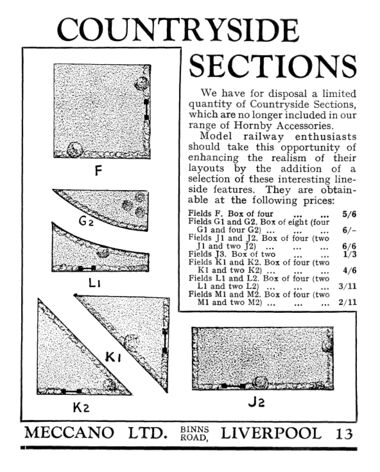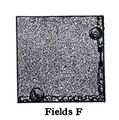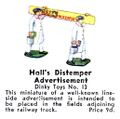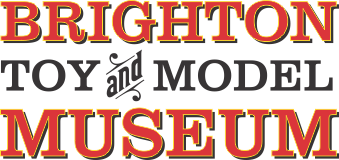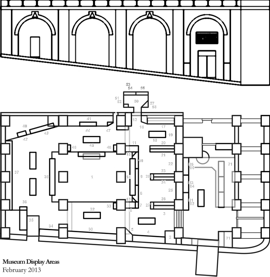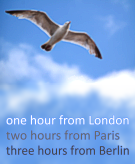Category:Hornby Countryside
| Exhibit |
|---|
Hornby Countryside Hornby Countryside Sections, catalogue page, 1934 (i) Hornby Countryside Sections, catalogue page, 1934 (i)
|
 |
| location: |
|
Arch Four , Area 37 The Adventures of Paddington (display) |
| Shelf
3
1932 |
1932: Hornby Countryside Sections, advert [image info]
Hornby Countryside Sections, layout planning [image info]
Hornby Countryside Sections, "Figure 8" [image info]
Hornby Countryside Sections, discontinuation, 1936 [image info]
A "Metroland" display of Hornby countryside accessories made in the early to mid 1930s, including horses, cows, sheep, and a lineside sign set that includes two workmen carrying a "Halls Distemper" sign.
In a world before easily-mouldable plastics (where the main plastic was "Bakelite") a certain amount of ingenuity was required to source parts for trees and shrubbery - hedges from this period were typically made from loofah - a cucumberlike vegetable that becomes very internally fibrous when mature, and whose "skeleton" is often used for bathroom backscrubbers.
Metroland
The display is backed by a straight section of gauge 0 track with an electric Metropolitan railway train, to reproduce the idyllic "Metroland" scenery used in the Metropolitan Railway's advertising (before the existence of the railway meant that the fields were then built on).
Hornby Countryside Sections
The Hornby "Countryside Section" sets appeared in the Hornby Book of Trains in 1932, and allowed owners to add scenery to their gauge 0 layout simply and easily with a set of pieces that fitted together inside and around the track
The effect of filling areas with Countryside Section pieces was to give the appearance of a section of countryside divided up into rectangular fields. The sections were green-painted, and typically had field hedges along one or two sides, and were dotted with the occasional tree of trees. Some of the rectangular sections also had breaks in their hedge-edging with access gates.
For a circular track, the centre space could be filled with just a couple of Countryside Section packs, one pack of four of the square F pieces to form a large square, and one pack of eight G1 curved and G2 filler sections to pad the large square out into a large circle.
The concave L1 and L2, and M1 and M2 pieces would then sit outside the curved track and pad it out into something more rectangular. If your circular track was extended to form an oval, your large central circular area could be separated and stretched with pairs of rectangular J1 and J2 extension pieces, whose width was the same as the length of of a standard piece of straight track, and if you'd used half-length straights, there was a thinner version of the extension piece, J3. Pieces K1 and K2 were used if you had a figure-of-eight track, to block in the area around the crossover section, and pieces H and R were used with level crossings, with one end of "H" slipped under the level crossing to provide a section of roadway, and the dummy section "R" slipped under the other side of the crossing so that it wouldn't end up on a tilt.
While the Countryside Section sets were obviously very useful to anyone who wanted to assemble a model railway layout that could be taken apart and packed away very easily, with minimal technical skill - making it especially useful for setting up temporary displays - most model railway owners were probably capable of gluing and pinning hedges and trees to pieces of green-painted hardboard themselves, and if they weren't, then learning was part of the fun of owning a model railway. Hornby discontinued the Countryside Section sets and got rid of their remaining stock in 1936, and anyone finding a set in their loft would be liable to think that they were not worth a great deal (and too bulky to be worth storing) so surviving pieces are very, very, very rare.
Catalogue images
Pages in category ‘Hornby Countryside’
The following 13 pages are in this category, out of 13 total.
C
- Countryside Section F (Hornby Series)
- Countryside Section G1 (Hornby Series)
- Countryside Section G2 (Hornby Series)
- Countryside Section H, roadway (Hornby Series)
- Countryside Section K2 (Hornby Series)
- Countryside Section L1 (Hornby Series)
- Countryside Section M1 (Hornby Series)
- Cows (Dinky Toys 2b)
Media in category ‘Hornby Countryside’
The following 29 files are in this category, out of 29 total.
- Countryside Sections (HBoT 1932).jpg 1,092 × 812; 203 KB
- Countryside Sections closeup01 (MM 1933-06).jpg 3,097 × 1,765; 907 KB
- Countryside Sections closeup02 (MM 1933-06).jpg 2,756 × 2,061; 989 KB
- Countryside Sections closeup03 (MM 1933-06).jpg 2,768 × 1,953; 970 KB
- Countryside Sections, assembled (HBoT 1932).jpg 4,289 × 1,521; 926 KB
- Fields F, Hornby Countryside Sections (HBoT 1934).jpg 807 × 811; 124 KB
- Fields G1, Hornby Countryside Sections (HBoT 1934).jpg 712 × 415; 46 KB
- Fields G2, Hornby Countryside Sections (HBoT 1934).jpg 712 × 415; 47 KB
- Fields J1, Hornby Countryside Sections (HBoT 1934).jpg 1,078 × 628; 120 KB
- Fields J2, Hornby Countryside Sections (HBoT 1934).jpg 1,078 × 628; 118 KB
- Fields J3, Hornby Countryside Sections (HBoT 1934).jpg 1,078 × 460; 67 KB
- Fields K1, Hornby Countryside Sections (HBoT 1934).jpg 807 × 811; 74 KB
- Fields K2, Hornby Countryside Sections (HBoT 1934).jpg 807 × 811; 76 KB
- Fields L1, Hornby Countryside Sections (HBoT 1934).jpg 712 × 415; 47 KB
- Fields L2, Hornby Countryside Sections (HBoT 1934).jpg 712 × 415; 49 KB
- Fields M1, Hornby Countryside Sections (HBoT 1934).jpg 613 × 693; 54 KB
- Fields M2, Hornby Countryside Sections (HBoT 1934).jpg 613 × 693; 54 KB
- Halls Distemper Advertisement, Dinky Toys No 13 (1935 BHTMP).jpg 515 × 511; 39 KB
- Hornby Countryside Sections (MM 1936-09).jpg 2,366 × 2,937; 1.07 MB
- Hornby Countryside Sections, layout (HBoT 1934).jpg 4,461 × 1,590; 932 KB
- Hornby Countryside Sections, oval (HTPYHR).jpg 1,807 × 1,465; 215 KB
- Hornby Countryside Sections, page (HBoT 1934).jpg 2,163 × 1,605; 657 KB
- Hornby Countryside Sections,Figure 8 (HTPYHR).jpg 1,110 × 2,345; 268 KB
- Hornby Fencing, with four trees (1935 BHTMP).jpg 910 × 640; 77 KB
- Hornby Hedging (1935 BHTMP).jpg 1,174 × 289; 69 KB
- Hornby Oak Tree (1935 BHTMP).jpg 359 × 1,052; 48 KB
- Hornby Poplar Tree (1935 BHTMP).jpg 392 × 957; 40 KB
- Roads H, Hornby Countryside Sections (HBoT 1934).jpg 1,078 × 460; 65 KB
- Supports R, Hornby Countryside Sections (HBoT 1934).jpg 712 × 415; 31 KB



